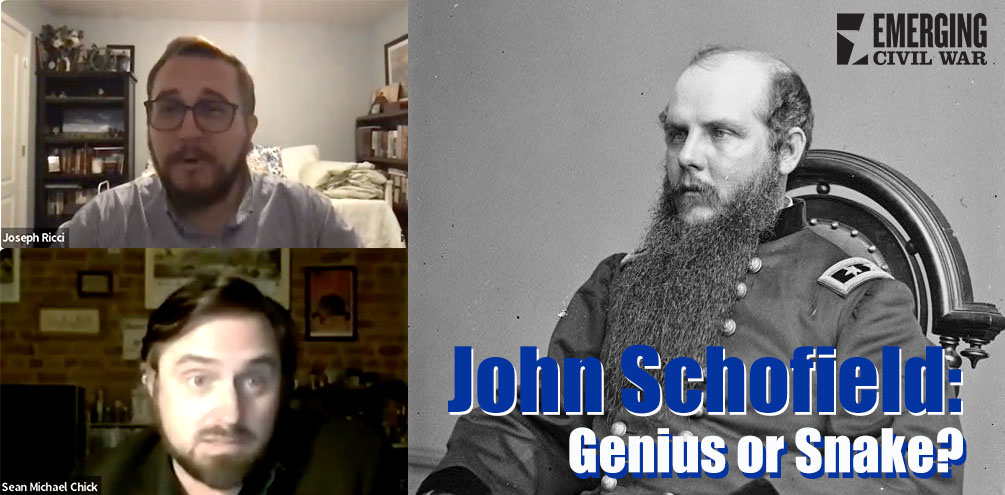ECW Podcast: John Schofield
On this date in 1864, Maj. Gen. John Schofield marched two Union corps past Gen. John Bell Hood’s Army of Tennessee at Spring Hill, Tennessee. Schofield’s escape set up the battle of Franklin the following day, Nov. 30, 1864. After severely bloodying Hood’s army there, Schofield slipped away and joined Maj. Gen. George Thomas’s forces in Nashville, Tennessee. The climactic battle of the campaign would take place there Nov. 15–16, although Schofield would cause problems for Thomas long after.
In the pantheon of top Union generals, Schofield usually gets passed over in discussion. His critics call him a snake in the grass. His partisans point to his eentual ascend to the position of General in Chief of the United States Army, where he proved to be one of the most consequential men to hold the post.
The latest episode of the Emerging Civil War Podcast, now available, features historian Joe Ricci of the Battle of Franklin Trust and historian Sean Chick, author of the Emerging Civil War Series book They Came Only to Die: The Battle of Nashville, as they chat with host Chris Mackowski about the life and legacy of General John Schofield.
This episode of the Emerging Civil War Podcast is brought to you by Civil War Trails, the world’s largest open-air museum, offering more than 1,500 sites across six states. Request a brochure at civilwartrails.org to start planning your trip today.
You can listen on Spotify here:
You can listen on Apple Podcasts here:

As a biographer John Schofield, I greatly enjoyed enjoyed this podcast. Everyone was knowledgeable, insightful, tough, and fair-minded.
I agree with general consensus that Schofield was a competent, but not great commander. He was reliable flank guard for Sherman in Atlanta campaign. I agree with Joe Ricci that Schofield’s memoirs can be self-serving and his army was in great danger at Springhill and only bold action by Wagner’s division and everyone keeping their heads did the army escape. I also agree with Sean Chick that his performance at Nashville was lamentable. I argued that Schofield was sulking because he felt Thomas had mislead him during his retreat to Nashville. I also argued that both 23rd Corps and 4th Corps, having fought so hard at Franklin, were rather timid at Nashville. It was the fresher Union units that carried the fight. Similarly, Confederate corps that fought at Franklin were the ones who cracked and it was Lee’s Corps that saved Hood from annihilation.
Sean, I continue to think it unlikely that Schofield wired Grant to criticize Thomas’s delay. I think Thomas supporters later conflated the message Schofield sent after Nashville with the pressure and almost relief by Grant before Nashville. As to MOH, officers were not eligible in the early days of the war. In 1890s there was a major review and many folks received MOH including David Stanley in 1893 for Franklin. As Commanding General, Schofield pushed for these to awards to recognize the aging veterans, just as he pressed to get as many former CW generals promoted back the general before they retired.
Again, I greatly enjoyed the podcast and Mr. Chick I look forward to reading your book on Nashville.
Donald B. Connelly
Basehor, Kansas